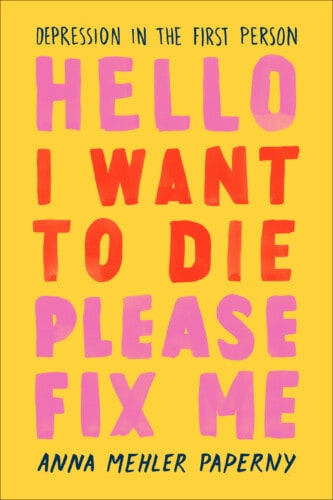CW: Self-harm, suicide, depression.
Anna Mehler Paperny is an award-winning journalist and a finalist for the Hilary Weston Prize in Nonfiction for her book, Hello I Want to Die Please Fix Me: Depression in the First Person.
In her stunning memoir, Paperny chronicles her experience of depression and her quest to explore what we know—and don’t know—about this disease that afflicts almost a fifth of the population. It provides an invaluable guide to a system struggling to find solutions and is a must-read for anyone impacted by depression—so, pretty much everybody.
We chatted with her this week.

SDTC: When was the first time you experienced depression?
2010.
And the last?
2019.
In Hello I Want to Die Please Fix Me, you open up about a personal experience. What happened?
I tried to kill myself in the fall of 2011, swallowing sleeping pills and antifreeze. It landed me in the ICU and, subsequently, in a psych ward. It was preceded by months of deepening despair until death felt like the only conceivable resolution. Afterward, I was committed to a psych ward but received care on discharge.
Rewind five years. What advice would you give yourself?
Take a breath and push forward. Make sure you’re doing all the interventions you can.
What did you learn in research for your book that really impacted you?
How long it’s been since our treatment modalities have improved, and how Indigenous Canadians miss out on the most basic care.
What do you hope readers take away from your book?
That depression and suicidality are real, debilitating illnesses that have been historically ignored with dire consequences.
What changes would you like to see happen in regards to how we view depression?
We need to take it seriously as a debilitating illness and we need to improve both the way we treat it and access to treatment, as well as the way we measure its effects.
What have you learned about yourself in the past year?
I’m actually able to be on the opposite side of an interview without wholly embarrassing myself, and have fun doing it.
What is commanding a lot of attention in your life lately?
Interviews related to the book are competing with my day job at Reuters. I guess it’s better to be busy than the alternative.
What is a fun, little-known fact about you?
I have a six-month-old Labradoodle named Baloo.
What film have you connected with recently?
Every time I watch The Paper I get inspired all over again (misogyny notwithstanding).
What’s the worst piece of advice you’ve been given?
Don’t sweat the small stuff.
What are the qualities you like least and most about yourself?
Least: Depression, suicidality, avoidance, procrastination.
Most: Construction with words.
What tip has made your life better in the past year?
Thought records, focusing on the immediate and getting a dog.
Describe your ideal Saturday scenario.
Walk-running my dog and chilling out with a good book.
What outfit makes you feel the most you?
Jeans and a t-shirt.
What’s surprised you lately?
The lack of mention of mental illness in the most recent federal election.
What is your motto at the moment?
Just keep going.
Enter to win Hello I Want To Die Please Fix Me, as well as the four other titles which are the finalists for the Writers’ Trust of Canada’s prestigious Hilary Weston Prize For Nonfiction here.
If you are experiencing distressing thoughts and are thinking about harming yourself, please reach out.
Distress Centre: 416-408-HELP (4357) offers access to emotional support from the safety and security of the closest telephone. Callers can express their thoughts and feelings in confidence. Callers’ issues can include problems related to domestic violence, social isolation, suicide, addictions, mental and physical health concerns. The Distress Centre offers emotional support, crisis intervention, suicide prevention and linkage to emergency help when necessary.
Gerstein Centre: (416) 929-5200 provides crisis intervention to adults, living in the City of Toronto, who experience mental health problems. The service has three aspects; telephone support, community visits and a ten-bed, short-stay residence. All three aspects of the service are accessed through the crisis line.



 Follow Us On Instagram
Follow Us On Instagram
